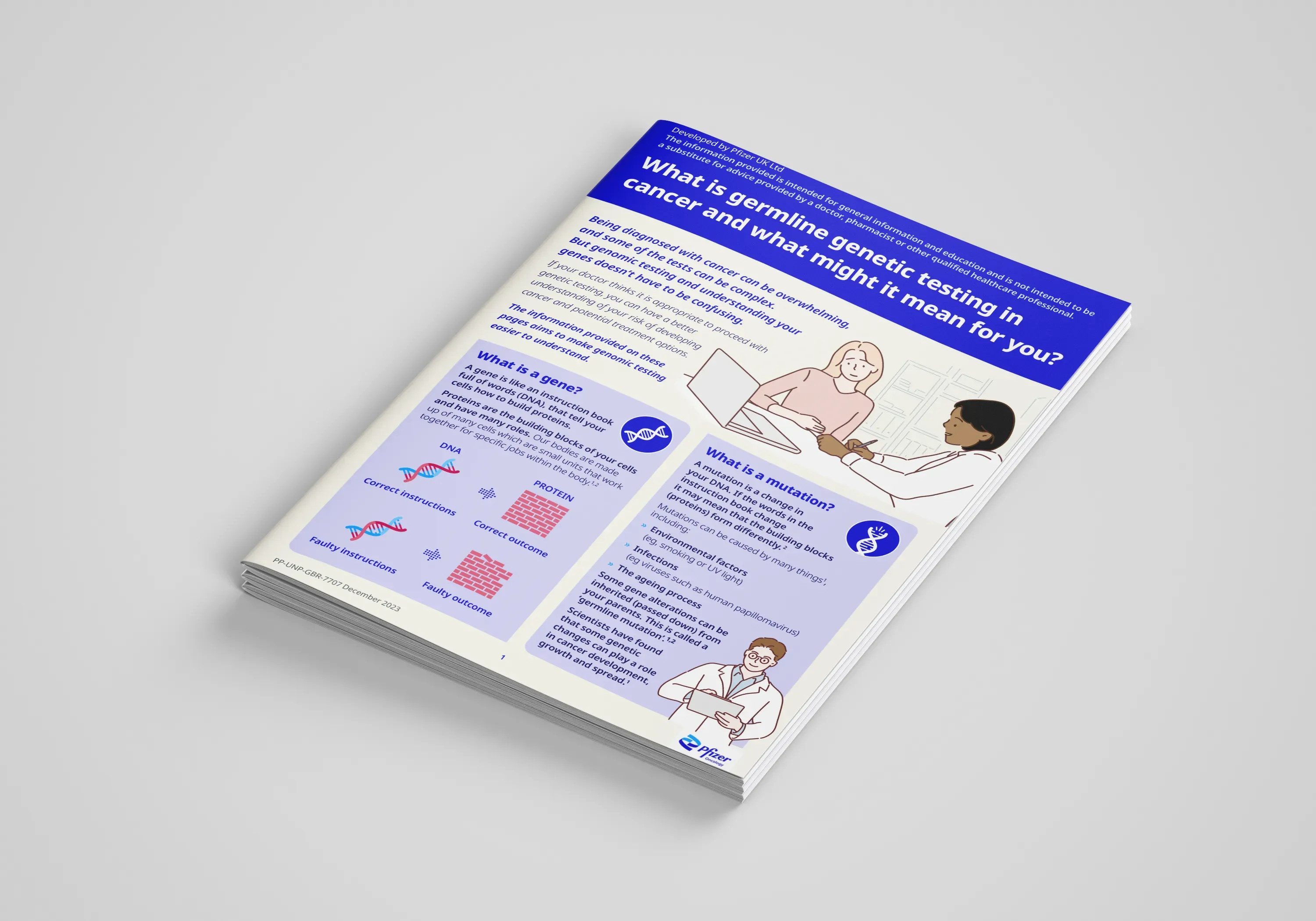What is genetic testing and why might I consider it?
Genetic testing is a way to look for differences in your genes that may increase your risk of getting a certain disease or cancer.1 There are two main reasons why you might think about getting a genetic test:2
- If many of your family members have had cancer and you think a high-risk gene might run in your family
- If one of your family members has a high-risk gene and you want to know if you also have the same inherited gene
Your GP might suggest genetic testing to see whether there is a chance that a high-risk gene or inherited disease runs in your family. Whether you have the test or not is your choice. You can ask as many questions as you need and take all the time you need to think it all through.
‘We didn’t have any history of cancer in our family but my Dad tested positive… it was really terrifying…but I felt that knowledge is power.’
Charlie was faced with making a decision about genetic testing when she was 20. You can hear her story below.
Hi, I'm Charlie.
I'm 26, and I found out that I'm a carrier of the BRCA2 genetic mutation when I was 20 years old.
I first found out that, you know what BRCA actually is because my parents are Ashkenazi Jewish.
My mom's a doctor, and she found out that they were doing a national study on Ashkenazi Jews around the country to find out what the increase was in our chances of being BRCA2 carriers since in our community there's a much higher risk of carrying certain genetic mutations.
My mom sat me down and told me about it and it was really scary at first because we didn't have any history of breast cancer in our family but my dad tested positive after they took part in a national study, and for me it was really terrifying information.
But I knew I wanted to get tested.
I knew that I wanted to start that journey, whatever it looked like and ultimately I felt that knowledge is power when it comes to testing.
And it's really important to arm yourself with as much information as possible.
So when I found out that I was a BRCA2 mutation carrier, what that actually meant for me was that it increased my risk of having breast cancer and developing it, which felt really scary.
And there are few options that I had at that point, either I could do nothing and just sort of hope that I was in that 30%.
I could increase my surveillance and go for regular mammograms and go down that route.
But for me, that felt like it would just produce a lot of anxiety over, you know, every year of my life when I would have to go in for those tests.
And then the third option was to have preventative surgery.
And that's the option that I ended up choosing to do, so when I was 22, I had a preventative double mastectomy where they reduced my risk of carrying, my risk of developing breast cancer, they removed all of my breast tissue and my nipples and put in implants instead.
I'm really happy that I made that decision. And I think that my life would be completely different if I hadn't.
I feel like I have so much more agency. I had so much more control over my body and the risks that I was putting myself in front of.
And I really am a huge advocate for anyone who's considering getting tested for anything that's a genetic mutation, whether that be BRCA or something else in their family.
If I had to give one piece of advice for people going through testing it is to do your best to find someone that's been through this before you, because there will be people.
It might feel like you're alone, but you're absolutely not and it's so important to create a community around you of people that are going to support, know what you've been through, probably know more about it than you do and can show you what life looks like after testing, whether that result be positive or negative, it will be fine.
And actually, I'm really pleased that I got the result that I did because it's meant that I found this incredible community of people all around the UK, and I'm just a huge advocate of testing for that reason.
If genetic testing is suggested for you, your GP will be able to put you in touch with a Genetic Counsellor.2,3 You can speak to them about any concerns or questions you have. You may also wish to speak with trusted family and friends about your feelings.
A Genetic Counsellor is someone who specialises in genetics and diseases that run in families.
They can have conversations with you relating to genetic testing and help you to decide whether to go ahead with it. 2,4
What does genetic testing involve?
Testing involves taking a small sample of your blood or saliva. The sample is sent to a laboratory to be tested for genetic mutations.5
It can take a number of weeks for the results to come back.1 This may feel like a long time and the wait can cause you to worry and over think. Before having a test, you should think about who you can go to for support during this time. Could chatting to a trusted family member or friend help you feel better while you’re waiting for your results?
How do I know if I am eligible for genetic testing?
The first step to finding out if you are eligible for genetic testing is to find out about the history of cancer in your family. The best way to do this is to talk to your family. You will need to know about your family members who have had, or have, cancer:2,4
- What type of cancer did they have?
- What age were they when they had cancer?
- How are they related to you and each other?
Once you have this information, you can decide the best way forward as a family. If someone in your family currently has cancer, the best next step is often for them to speak to their GP and ask for a genetic test. If the GP thinks there is a chance cancer may run in your family, they will offer you the opportunity to see a Genetic Counsellor.2,3
Remember, if a potential genetic change is found and you are offered a genetic test, it is up to you whether you decide to go ahead with the test or not.
It is also possible to get a genetic test privately. You will have to pay to have a private test, and not all private test results will be accepted by the NHS. So, it’s good to do your research and make sure you fully understand the process and what will be included.
How do I decide whether to have a genetic test?
There is a lot to think about when deciding whether to have a genetic test or not. Before you decide whether to have a test, it can help to think about these questions:2
- How do I feel about having a test?
- Do I want to know if I have an increased risk of getting cancer?
- What will I do if my result shows I do have an increased risk of getting cancer? Is there anything I can do to stop getting cancer?
- Will I feel better if my results show I do not have an increased risk of getting cancer?
- Who else might be at risk in my family?
- Who can I talk to about having a test?
When it comes to deciding whether to get a test, there is no right or wrong answer. It is completely your choice. Talking to your Genetic Counsellor or trusted family and friends may help you make your mind up.
What are the advantages and disadvantages of getting a genetic test?
There is a lot to think about when deciding if you should get a test. It can be helpful to think about the possible upsides and downsides, to help you decide.6
The potential upsides:
- You might find knowing your result (if it is good or bad) is less of a worry than not knowing
- If you know you are at a higher risk of getting cancer, you could have check-ups to look for the early signs. Having regular checks can identify signs of cancer earlier and, if there are any signs, it means you can start treatments earlier, which might reduce the risk of it developing further
- It should put your mind at rest if you find out you don’t have a higher risk of getting cancer
The potential downsides:
- If you know you are at a higher risk of getting cancer you may find it hard to stop thinking and worrying about it
- The result of your test may be unclear or inconclusive so you may not get an answer, and this can be hard to cope with
- If a genetic test has been suggested and you have any questions, speak to your GP or Genetic Counsellor who will be able to give you more guidance. There are also plenty more useful resources on this site to help you learn more about genetic testing and what it means for you and your family.
Understanding genetic testing and whether it is the right choice for you can be daunting. Speak with your doctor or healthcare team if you have any specific questions. They will be able to offer guidance based on your individual situation.

What is genetic testing in cancer and what might it mean for you?
We’ve summarised some of the key information around genetic testing and cancer into a more readable form. You can download it here, to help you and your family navigate these personal decisions.
References
- Macmillan. Genetic testing for cancer. Available at: https://www.macmillan.org.uk/cancer-information-and-support/worried-about-cancer/causes-and-risk-factors/genetic-testing. [Accessed: June 2025].
- Cancer Research. Genetic testing for cancer risk. Available at: https://www.cancerresearchuk.org/about-cancer/causes-of-cancer/inherited-cancer-genes-and-increased-cancer-risk/genetic-testing-for-cancer-risk. [Accessed: June 2025].
- NICE. Familial breast cancer (breast cancer in the family). June 2013. Available at: https://www.nice.org.uk/guidance/cg164/resources/familial-breast-cancer-breast-cancer-in-the-family-pdf-246406340293. [Accessed: June 2025].
- Macmillan. Genetic counselling? Available at: https://www.macmillan.org.uk/cancer-information-and-support/worried-about-cancer/causes-and-risk-factors/what-is-genetic-counselling. [Accessed: June 2025].
- National Cancer Institute. Genetic testing for inherited cancer susceptibility syndromes. Available at: https://www.cancer.gov/about-cancer/causes-prevention/genetics/genetic-testing-fact-sheet. [Accessed: June 2025].
- Evans J et al. The Complexities of Predictive Genetic Testing, BMJ 2001; 322: 1052-6: doi: 10.1136/bmj.322.7293.1052. [Accessed: June 2025].






